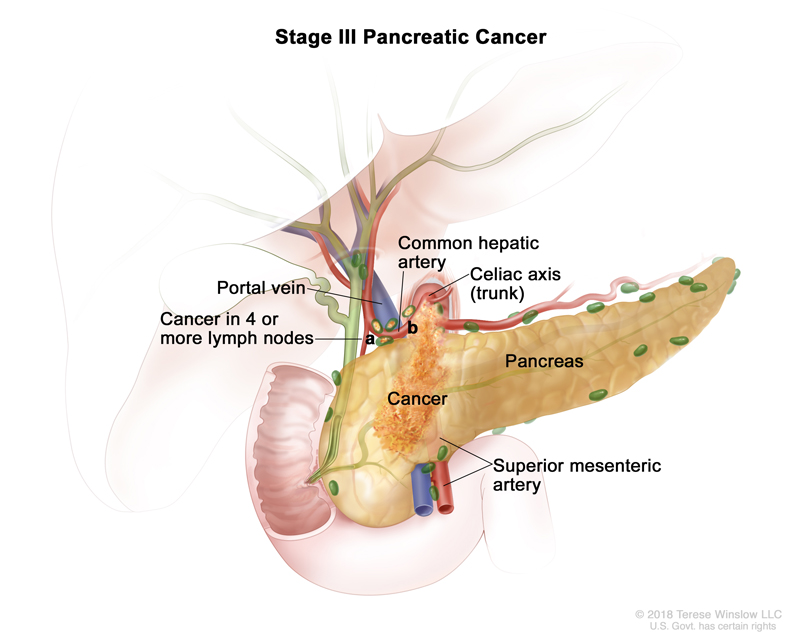Stage 3 Pancreatic Cancer ICD 10 is C25.1.
Tap “Watch Now” for an easy-to-understand overview of Stage 3 Pancreatic Cancer.
- Stage 3 Pancreatic Cancer
Overview
A Stage 3 Pancreatic Cancer diagnosis means that:
1. The tumor in your pancreas is any size and it has spread to 4 or more nearby lymph nodes shown at point a,
or,
2. The tumor has spread to your major blood vessels near the pancreas as shown in the image at point b.
This type of locally advanced Pancreatic Cancer has spread in such a way that surgery cannot completely remove the cancer. This is what makes it un-resectable.
What Tests Will I Need and Why?
Blood and Imaging tests are done to understand your general health, confirm your diagnosis and determine your cancer stage.
Tissue analysis can be done to identify the cancer cell type, which is critical to finding the best treatment option for you.
You may also require special Saliva or Blood Analysis to look for specific mutations (actual changes in your body’s DNA), called BRCA1 and BRCA2.
If your treatment team has not already performed tests to determine your cancer’s features, please ask your doctor when these tests will be performed.
Re-read this summary as needed and then tap, “Compare My Treatment Options Now“. Our unique Comparison Page will help you understand your FDA-approved treatment options including, who can help you pay for your treatment, where and how each is given and what side-effects you may experience.
Replay this audio as often as needed and then take a look at our Commonly Searched Questions below.

National Institute of Health/ treatment-pancreatic
Recommended Pancreatic Cancer Videos

Pancreatic Cancer: Treatment and Outcomes
Overview, Treatment and Outcomes

Pancreatic Cancer: Diet & Nutrition
Managing Pancreatic Cancer

How Cancer Spreads
Metastatic = Advanced

Diagnosing Your Cancer
How Does a CT Scan Work?

Diagnosing Your Cancer
How Does a PET Scan Work?

Exercise! You Can Do It
Reducing Side Effects & More
Commonly Searched Questions
Stage 3 Pancreatic Cancer Definition
Source: Pancreaticcancer.org.uk
Stage 3 Pancreatic Cancer Survival Rate
Source: Onco.com
Stage 3 Pancreatic Cancer Treatment
Source: Pancan.org
Stage 3 Pancreatic Cancer Symptoms
- Abdominal pain that radiates to your back
- Loss of appetite or unintended weight loss
- Yellowing of your skin and the whites of your eyes (jaundice)
- Light-colored stools
- Dark-colored urine
- Itchy skin
Source: Mayoclinic.org
Stage 3 Pancreatic Cancer Recurrence Rate
Source: Cancer.gov
Stage 3 Pancreatic Cancer Prevention
- Healthy Diet: Eat a diet rich in fruits, vegetables, and whole grains.
- Maintain a Healthy Weight: Achieve and sustain a healthy weight through balanced eating and regular physical activity.
- Avoid Smoking: Refrain from smoking and avoid exposure to secondhand smoke.
- Limit Alcohol Consumption: Drink alcohol in moderation or not at all.
- Manage Chronic Conditions: Effectively manage conditions like diabetes and chronic pancreatitis.
Source: Cancer.gov













